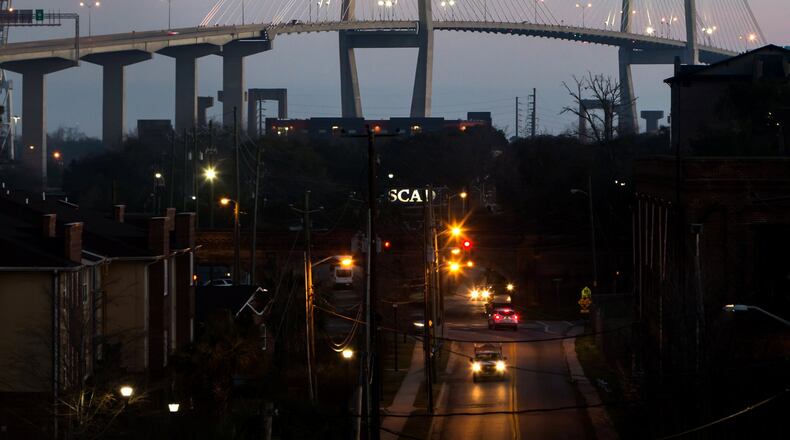Some want the bridge heading from Savannah to South Carolina to be named for the Native Americans who first inhabited the area.
Others want the bridge spanning the Savannah river to bear the city’s name. Still others believe the structure should honor the founder of the Girl Scouts, who was a Savannah native.
What a lot of folks in this majority African-American city seem to agree on is that it should no longer carry the name of former Georgia Gov. Eugene Talmadge, an ardent segregationist.
The suspension bridge has been associated with Talmadge since it was constructed in 1991, and signs attest to that.
However, Savannah Republican Rep. Ron Stephens argues, the structure has never officially been named.
Stephens has proposed House Resolution 1054, which would name the bridge for Juliette Gordon Low, the founder of the Girl Scouts.
The measure brought hundreds of Girl Scouts, armed with their famed cookies, to the statehouse earlier this month to lobby lawmakers to make the change.
“There’s never been in the history of Georgia a more prominent female than Juliette Gordon Low,” Stephens said. “It’s time that we start naming things after prominent females in Georgia history.”
State Sen. Lester Jackson, D-Savannah, has introduced similar legislation, Senate Resolution 715, in the Senate.
Stephens has been working on the issue for several years at the behest of local politicians and citizens.
Savannah residents who talked to the Atlanta Journal-Constitution recently were unaware that there is no record of the bridge constructed in 1991 officially being named after Talmadge.
A state House resolution approved that year shows that the chamber asked for the new bridge, which replaced one constructed 1953, to “continue to be known as Eugene Talmadge Memorial Bridge.”
However, the Senate did not approve a similar request. In the 1990s the Georgia Department of Transportation was the authority that named roads and bridges.
Georgia Department of Transportation officials say a 1956 resolution named the original bridge constructed three years prior after Talmadge, and since the span takes the same road into South Carolina, the name transferred to the 1991 bridge.
Stephens insists the name was only attached to the original bridge.
“There just needs to be a little education to let folks know that it was never named,” he said. “We now have an opportunity to put a (new) name on there.”
And for him, he said, it’s not about removing the name of the former white supremacist governor.
“If this name were placed legally on the bridge by the General Assembly or by the Department of Transportation, which had the authority to do that back in the ’90s, then I would not be going down this path today,” he said. “I don’t believe we need to be removing names or changing names of bridges or monuments.”
That is a touchy topic in the General Assembly, where the majority has stalled legislation allowing local communities to remove or move Confederate monuments.
Whatever the motivation, many Savannah residents appear to be ready to part with the Talmadge name. Last September, the Savannah City Council passed a resolution urging state officials to call the structure the Savannah Bridge.
Earlier this month, locals said they were ready for a new name.
“If it has such a horrible legacy behind the name and brings back horrible memories, I’m for changing the name,” said Savannah resident Kiambrae Wright.
As a former Girl Scout, she said she likes the idea of naming the bridge for the group’s founder.
Jamal Touré, a local historian who leads African-American history tours and teaches Africana studies at Savannah State University, said he doesn’t think naming the bridge for Low fully reflects the history of the area.
“We have nothing prominent that honors the Native American history here,” he said. “What’s more unifying than naming it for the Yamacraw tribe, or (its Chief), Tomochichi?”
While Jackson, the state senator, said he believes it’s appropriate to name the bridge after Low and filed a resolution that would do so, he too thinks there is a need to recognize Native Americans.
“Other than a public housing center, there’s nothing to honor the people who helped the first settlers,” he said.
Stephens said he’s confident his resolution will make it through the House, having been easily approved last week by a subcommittee vetting the proposal.
As he explains the history of the bridge’s name to his fellow lawmakers, Stephens said, he gains support.
“It’s funny. Whenever people have the same misconception as most that this bridge was named, most people feel like it shouldn’t be changed,” he said. “Their attitudes immediately change once they realize that the bridge was never (officially) named.”
About the Author
Keep Reading
The Latest
Featured


